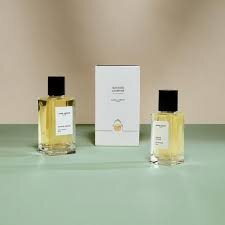Conscious Consumer Gift Pick - Sana Jardin
/Have you heard about the term conscious consumerism? It’s when buying practices are driven by a commitment to making purchasing decisions that have a positive social, economic, and environmental impact. I appreciate what I’ve been seeing as I explore conscious brands as I get away from the clean and greenwashing of the beauty industry.
When I first find a new product I usually look them up on Instagram and sometimes I'll make it onto their website, but I’m glad I checked out Sana Jardin’s about section because I fell in love with her mission.
Our mission is to harness the power of commerce for social good. Sana Jardin is a socially conscious, luxury fragrance house. Our vision is to use clean and sustainable perfume as a vehicle for social impact and the economic empowerment of women. Sana Jardin is built on the principles of a circular economy - our alternative business model enables the women in our supply chain to become micro-entrepreneurs by up-cycling the waste products from perfume production.
We believe that if we’re innovative about the way we use commercial waste, we can recycle it for the benefit of the women at the beginning of our supply chain and help them to flourish and thrive.
At that point, I would get any fragrance from the site and hope for the best, but it gets better. She dives more into how she incorporates upcycling and circular economy principles to go beyond sustainability. As someone working on a similar project that I hold close to my heart, I hope this inspires more upcoming brands to think bigger on the impact they can have through their brand.
"The Problem: The female harvesters from the rural flower-growing region in Morocco, had limited access to work - just a few times a year, during the harvest. They also didn’t have opportunities for consistent employment due to their lack of skills training. In addition, 900 tonnes of natural and organic orange blossom waste by-product is created from the region.
The Solution: We aim to address these problems through our Beyond Sustainability™ model, which empowers the floral harvesters with the skills and materials they need to increase their wages through commerce, not charity. The model is based on “flower recycling” within a circular economy and illustrates that luxury business can be used to drive social change. We offer business skills training to the local women so they can develop and sell their own range of products; candles and orange blossom water - all of which came from the waste of perfume production. They receive 100% of the proceeds.
To facilitate this we partnered with Nest (a non-profit) and Les Aromes du Maroc, to establish a women’s cooperative in Morocco, where the women can produce and sell their products.
If anyone married to me reading this is looking at what could be a great gift idea for our anny, my birthday, or Mother’s Day. . . look no further than this link to Savage Jasmine that I’m about to drop.
For everyone else, DM me on Instagram at @JasminePennamma and let me know if conscious consumerism is a principle you may have been practicing without knowing the term or if it’s something you would like to put into practice more now that you are aware of it. Can’t wait to chat with you! xx - Jasmine





